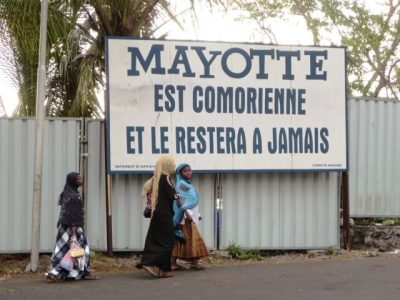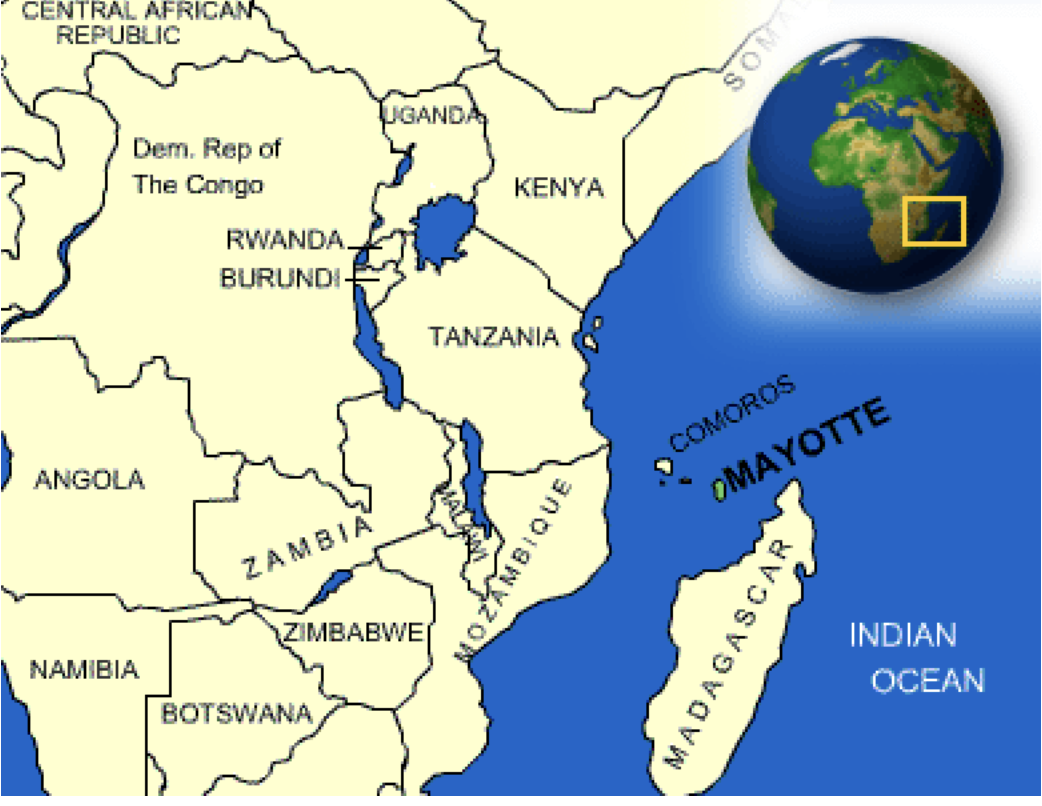The Mayotte Island Crisis: Putrid Leftover of France’s Imperialist and Colonialist Scrooge?

All Global Research articles can be read in 51 languages by activating the Translate Website button below the author’s name.
To receive Global Research’s Daily Newsletter (selected articles), click here.
Click the share button above to email/forward this article to your friends and colleagues. Follow us on Instagram and Twitter and subscribe to our Telegram Channel. Feel free to repost and share widely Global Research articles.
***
The cycle of empires
It is not as if President Macron and his administration needed a new crisis to add to the turmoil of his second term in power. Unlike Mali or Burkina Faso, where French troops were bluntly asked to leave by military juntas, Mayotte is in effect a full-fledged French department. The reminiscence of a vast empire that has almost entirely vanished. All empires fade in their respective historical time frames.
Some finished abruptly, like the Ottoman empire in the immediate aftermath of World War I when the imperial victors (the United Kingdom and France) dismantled it through the Syke-Picot secretive 1916 treaty that determined their respective colonial spoils of war in the entire Middle-East. Some empires, like the British and French empires in more recent times, face a slow erosion following the flux of struggles for self determination and finally independence of indigenous populations from colonial powers.
Even in vanishing empires struggle against colonialism continues
In the giant geopolitical turmoils of post World War II some anti-imperialist leaders emerged. One of them was the Indonesian revolutionary figure Sukarno, who headed the struggle of Indonesia’s independence from the Dutch colonial power. In a statement that has a universal appeal, Sukarno wrote: “I hate imperialism. I detest colonialism. And I fear the consequences of their last bitter struggle for life. We are determined, that our nation, and the world as a whole, shall not be the plaything of one small corner of the world.”
Mayotte a mini-Algeria in the making for Macron?
First of all, some brief historical elements are necessary here. The two small islands of Mayotte are part of the Comoros Archipelago. The Comoros were first populated by migrants from East Africa, then invaded by Arabs during the 15th century. The Arabs brought Islam to the Comoros, and 600 years later Islam remains by far the dominant religion. The Mahorais in Mayotte are the local and legal population; a large majority are proud to be French, and many consider the illegally immigrated Comorans to be interlopers who should be kicked out, as they feel their standards of living is under assault.
In many ways, even though the two populations, Mahorais on one side and Comorans on the other, are racially and religiously quasi identical, it is as if the Mahorais are the privileged white colonists, which in Algeria were called Pieds Noirs, and the Comorans are Mayotte’s equivalent of the oppressed Arab population. This indicates that the economic gap between groups of people struggling for their rights to the same land matter more than cultural, racial, or religious divides.
In this case, it is a struggle between the poor, the Mahorais, and the destitute who are the freshly arrived illegal Comorans. There is nothing better than reducing the size of the pie to turn vicious the fights at the family table! Since the 1974 referendum, which kept Mayotte as a French territory, with two-thirds of Mahorais voting in favor, France has not done enough for its citizens in Mayotte. It has also neglected to provide financial assistance to the Comoros, which would have avoided the large illegal migrants flux. It has been pretty much 50 years of bad policies, but mostly neglect towards Mayotte from one Paris administration after another.
Forget Operation Wuambush (take back) instead fight poverty
Operation Wuambush is headed by France’s Minister of the Interior, Gerald Darmanin. The name is highly symbolic as it implies a reconquest after an invasion. The muscle of the cleaning, or pacification, operation involves 2,000 Gendarmes and the French riot police, CRS. The ill-advised plan appears to be simple: it consists of the demolition of countless shantitowns, and the expulsion, manu militari, of the illegal migrants to the Comoros. But, there is a huge problem for the Macron administration and Mr. Darmanin.
According to a very official Institut National de la Statistique et des Etudes Economiques (INSEE), if an official census of 2017 established the legal population of Mayotte at 256,500, in reality, considering that more than 50 percent are illegal migrants, and therefore not registered, the real number of Mayotte’s booming population could be as high as 500,000. The two communities, by and large, do not get along.
To grasp fully the explosive nature of the Mayotte situation, some key figures are needed. The birth rate in Mayotte is extremely high: in 2021 it was 4.6 children per woman. Furthermore, half of the population is below 18-years-old. Yet more disturbing official data from INSEE: in Mayotte, an astounding four in ten residences are precarious dwellings made of scavenged materials such as pieces of plywood and corrugated metal sheets; three out of ten habitations lack running water; in 2022 Mayotte’s unemployment rate was 34 percent; last but not least, in 2018, 77 percent of the population was living below France’s poverty level.
Darmanin’s naked ambitions?
One must wonder: why this repressive anti-migrant operation, and why now, while in France proper a deep political turmoil is at play in the aftermath of the extremely unpopular retirement reforms? Unless it is a diversion tactic, the timing of it seems completely off. Could the operation of pacification of Mayotte be a stepping stone for Mr Darmanin’s own political ambitions?
Many political insiders in France have said that the ambitious Interior Minister has his eyes on the job of current Prime Minister Elizabeth Borne. It might also be a sign of bigger goals for him down the line, and why not the presidency of France? Spearheading this policing operation could boost Darmanin’s appeal to the anti-immigration xenophobic electorate of Marine Le Pen’s party, which is substantial.
He has certainly established himself as a tough law-and-order proponent, modeling his persona to that of Nicolas Sarkozy who, by the way, started his political career as Jacques Chirac’s Minister of the Interior. As the Minister of the Interior, the advantage of heading France’s vast security apparatus is that you know where the skeletons are buried.
At the last presidential election’s second round in 2022, Marine Le Pen obtained almost 60 percent of the vote in France’s overseas territories. This vote, considering that Le Pen’s party is rooted in a culture of nationalism and xenophobia, is sociologically highly disturbing as it is completely detached from history in places that have been so deeply marked by the memory and collective pain of slavery and colonialism.
More specifically, in Mayotte during the 2022 French presidential election, Marine Le Pen obtained 43 percent in the first round, against 24 percent for Jean-Luc Melenchon of the left party La France Insoumise, and 17 percent for Emanuel Macron. During the second round, which opposed Macron to Le Pen, Marine Le Pen garnered 59 percent of the vote versus 41 percent for Macron. Needless to say her edge and appeal to a majority of Mayotte’s electorate was based on her anti-immigration Trumpist-like nationalist and populist agenda.
Jean-Marie Le Pen, who fought in France’s colonial wars first in Indochina and then Algeria, was echoing and embracing the Algerie Francaise! battlecry of French colonists. By contrast to his daughter, Le Pen was less than welcome in the overseas territories when he was politically active. In fact he was banned from landing in Martinique by the local authorities.
Despite what Mr. Macron and Mr. Darmanin, or other people in their fancy offices in Paris, think and plot, the time of France-Afrique is long gone. Mahorais and Comorans are brothers and sisters. In faith, race and unfortunately poverty they must learn how to get along and manage their own conflicts without becoming the instruments of French politicians of various stripes. A comprehensive dialogue must open up between all the citizens of the Comoros archipelago which, like it or not, includes Mayotte.
While it is the most far-right anti-migrant Mahorais that have formed quasi vigilante groups to attack Comorans and torched their makeshift homes, the government of the Comoros is not blame free. Their refusal to take back their citizens who have migrated to Mayotte could also be a way to modify Mayotte’s demographics in the medium term. Migrants can be easily weaponized, like Qaddafi did in Libya, or Erdogan did in Turkey with Syrian refugees, to blackmail the European Union. Soon having (right now it is 50 percent) more Comorans on the island than Mahorais could validate their claim that the island, despite the 1974 referendum, belongs to the Comoros and not to France.
Mayotte is a case study not only in neocolonialism, but also in the global migration crisis, as it illustrates that the world at large will have to absorb and manage, in a non-repressive human way if at all possible, the flow and cost of massive migration due to the increasing catastrophic impact of climate collapse.
*
Note to readers: Please click the share button above. Follow us on Instagram and Twitter and subscribe to our Telegram Channel. Feel free to repost and share widely Global Research articles.
This article was originally published on News Junkie Post.
Gilbert Mercier is the author of The Orwellian Empire. He is a regular contributor to Global Research.
Featured image is by David Stanley


